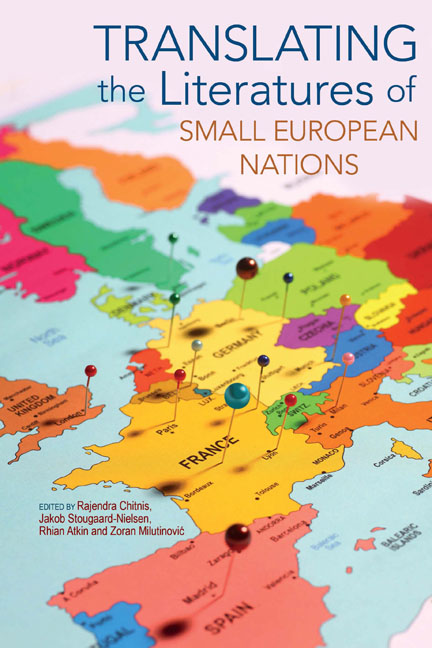Book contents
- Frontmatter
- Contents
- Acknowledgements
- Introduction
- 1 The Global Presentation of Small National Literatures: South Slavs in Literary History and Theory
- 2 Translators as Ambassadors and Gatekeepers: The Case of South Slav Literature
- 3 Supply-driven Translation: Compensating for Lack of Demand
- 4 Literature as Cultural Diplomacy: Czech Literature in Great Britain, 1918–38
- 5 Exporting the Canon: The Mixed Experience of the Dutch Bibliotheca Neerlandica
- 6 Creative Autonomy and Institutional Support in Contemporary Slovene Literature
- 7 Strategies for Success? Evaluating the Rise of Catalan Literature
- 8 Gender, Genre and Nation: Nineteenth-century Swedish Women Writers on Export
- 9 Translating as Re-telling: On the English Proliferation of C.P. Cavafy
- 10 Criminal Peripheries: The Globalization of Scandinavian Crime Fiction and Its Agents
- 11 Literary Translation and Digital Culture: The Transmedial Breakthrough of Poland's The Witcher
- 12 Towards a Multilingual Poetics: Self-translation, Translingualism and Maltese Literature
- 13 Does Size Matter? Questioning Methods for the Study of ‘Small’
- Coda: When Small is Big and Big is Small
- Index
1 - The Global Presentation of Small National Literatures: South Slavs in Literary History and Theory
- Frontmatter
- Contents
- Acknowledgements
- Introduction
- 1 The Global Presentation of Small National Literatures: South Slavs in Literary History and Theory
- 2 Translators as Ambassadors and Gatekeepers: The Case of South Slav Literature
- 3 Supply-driven Translation: Compensating for Lack of Demand
- 4 Literature as Cultural Diplomacy: Czech Literature in Great Britain, 1918–38
- 5 Exporting the Canon: The Mixed Experience of the Dutch Bibliotheca Neerlandica
- 6 Creative Autonomy and Institutional Support in Contemporary Slovene Literature
- 7 Strategies for Success? Evaluating the Rise of Catalan Literature
- 8 Gender, Genre and Nation: Nineteenth-century Swedish Women Writers on Export
- 9 Translating as Re-telling: On the English Proliferation of C.P. Cavafy
- 10 Criminal Peripheries: The Globalization of Scandinavian Crime Fiction and Its Agents
- 11 Literary Translation and Digital Culture: The Transmedial Breakthrough of Poland's The Witcher
- 12 Towards a Multilingual Poetics: Self-translation, Translingualism and Maltese Literature
- 13 Does Size Matter? Questioning Methods for the Study of ‘Small’
- Coda: When Small is Big and Big is Small
- Index
Summary
The literatures of small European nations are dependent on their larger and more visible neighbours to facilitate their introduction and acceptance in an international literary context, as this volume will repeatedly show. They are therefore in meaningful ways subordinate to their more significant others. Dominant nations offer two types of model for others to follow: first, they exert an influence by exporting new stylistic features that are then received abroad and emulated as signs of poetic novelty and experiment; second, their literary histories offer a system of periodization and classificatory terms which smaller nations are compelled to adopt to realize themselves within recognized historical patterns. The unidirectional system of exchange offers a vital channel of communication for subordinate literatures, bestowing some degree of recognition on a particular author or on a body of cultural products and granting a degree of cultural legitimacy. In this chapter, I shall examine this international context by addressing first what has been said by representatives from dominant literary and linguistic cultures about the status of the literatures of small nations, and then what has been said by representatives from small nations about their own cultural status and literary histories. In both sections, literature figures as part of a relational structure combining a sliding scale of large and small literatures stretching across Europe, from those considered the most prestigious to those considered the most peripheral. My case study of Serbia as a small nation in this respect also includes reference to Serbian literature within the regional network of other Yugoslav cultures.
Serbian and other Yugoslav literatures are considered small, minor or dominated because of the low numbers of those who would lay claim to them as part of their cultural heritage. The relatively low number of speakers of a common language or inhabitants in a particular culture space are not the only criteria for considering a literature to be small. Their lack of ‘literary resources’ is a more significant factor (Casanova, 2004, 15). These resources are indicators of prestige and allow a national cultural space the ability to grant recognition even beyond its own borders via its powerful combination of an influential reading public, a language with many active users who are not native speakers, an institutional infrastructure encompassing academic, publishing and other specialized sectors able to disseminate judgements for domestic and foreign consumption.
- Type
- Chapter
- Information
- Publisher: Liverpool University PressPrint publication year: 2019



